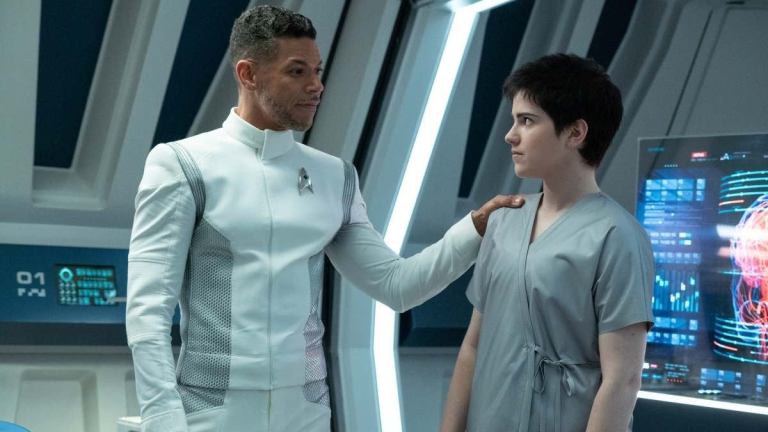Star Trek: Discovery is Finally Addressing Its Crew’s Trauma
In this exclusive clip from this week's all-new episode of Star Trek: Discovery, Hugh is asking all of the right questions.

Star Trek has always strived to represent a more hopeful and healthy future for our society. However, because it is being made in our present, with all of its strengths and struggles, it hasn’t always done the best job depicting mental illness or how a utopian future might contextualize it. (Sorry, Counselor Troi. You tried.) As contemporary culture gets better at discussing and destigmatizing mental illness, so do our stories (and vice versa), which gives Star Trek: Discovery a potential advantage. If this exclusive clip from tomorrow’s all-new episode is any indication, the show is finally making use of it…
“Forget Me Not,” the fourth episode of the season, sees Burnham and Adira pay a visit to the Trill homeworld in an attempt to unlock Adira’s memories and the memories of their Trill symbionts. But, first, Hugh has to dispense some friendly mental health advice to Michael—namely, around the subject of “post-traumatic growth.” According to the theory, as outlined by Hugh, “certain life events … can inspire us to evolve, to live our lives in a different way.” Michael is in the midst of this process following the traumatic experience of arriving in the future totally alone, and now Adira is poised to go on their own path of post-traumatic growth as they look for answers about their Trill symbiont. Check out the exclusive clip of Hugh and Michael’s conversation below…
It’s both fascinating and inspiring to see Star Trek: Discovery lean into the importance of mental health and the effects of trauma in this third season. This crew has been through a lot (and that was before they jumped through time leaving everything and everyone they ever knew behind) but the show hasn’t always been the best at a) showing the consequences of that trauma or b) having Hugh and other medical professionals on board the Discovery address the trauma in a way that would be necessary for a functioning ship. From the looks of this clip and Hugh’s concern, that might be about to change.
In the clip, Hugh also diagnoses Michael as a “responsibility hoarder,” which is a very loving way of telling Michael that she takes on the problems of the world around her without making sure to take care of herself—a description that fits many a TV protagonist and many a real-life human being. That way leads madness. To see Star Trek: Discovery gently call out its central character in this way is pretty cool, especially if the series follows through on depicting the consequences of trauma for Michael and other characters past this scene and this episode. Star Trek is a science fiction drama that engages with big ideas. Sometimes, that means exploring the concept of what it means to be human and sometimes that means wondering how trauma, of both the individual and collective varieties, changes us.
“Forget Me Not” premieres on CBS All-Access tomorrow, Thursday, November 5th.
